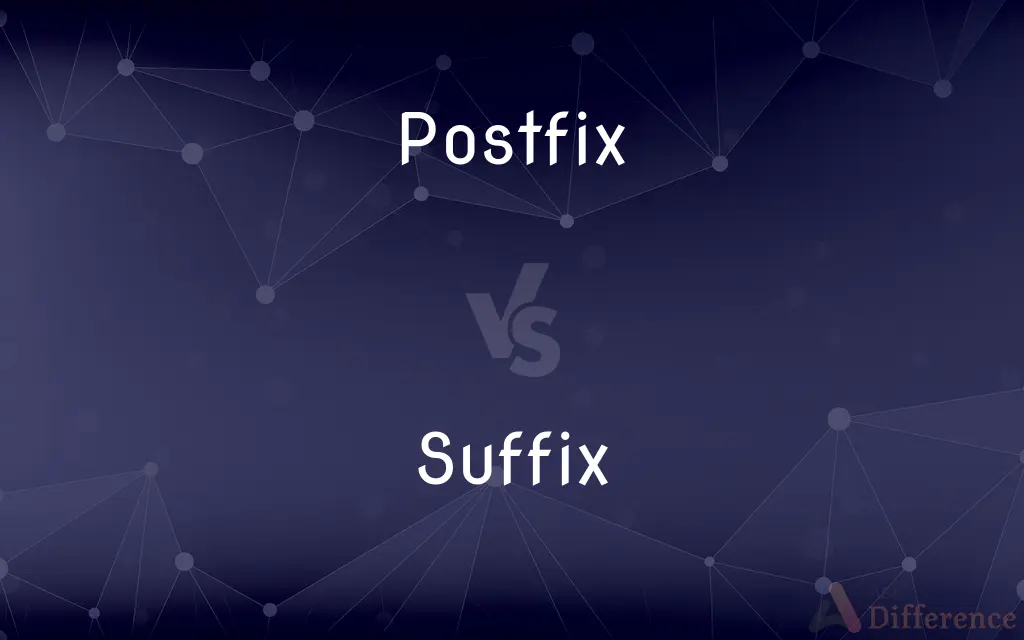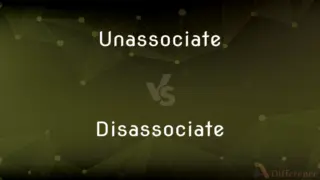Postfix vs. Suffix — What's the Difference?
By Tayyaba Rehman — Updated on September 26, 2023
A "postfix" is an operator placed after its operand in mathematical notation, while a "suffix" is a set of letters added to the end of a word to change its meaning. Both deal with elements placed after a primary component, but in different contexts.

Difference Between Postfix and Suffix
Table of Contents
ADVERTISEMENT
Key Differences
A "postfix" predominantly pertains to the field of mathematics and computer science. It references a notation where the operator follows the operand. For instance, in the expression "AB+", "+" operates on A and B. This form of notation, especially relevant in certain algorithms, eliminates the need for parentheses to indicate operations order. On the other hand, a "suffix" is rooted in linguistics and grammar. It concerns a group of letters or a morpheme added to the end of a word, subsequently altering or refining its meaning.
The application of "postfix" is evident in specific computing algorithms, particularly in how some calculators and programming languages process mathematical equations. Using postfix notation, also known as Reverse Polish Notation (RPN), can make computations more straightforward in particular contexts. Conversely, the concept of "suffix" aids in word formation and the derivation of new terms. For example, by adding the suffix "-able" to "read," we derive the word "readable."
In everyday communication, one would encounter the term "suffix" more often. It's a foundation of morphology in many languages, including English, and plays a pivotal role in expanding vocabulary. In contrast, "postfix" remains a more specialized term, with its usage more common among individuals in technical fields, especially those dealing with certain mathematical computations or specific programming paradigms.
In essence, while both "postfix" and "suffix" deal with an element or set of elements placed after a primary component, they serve different purposes and are utilized in distinct domains: "postfix" in mathematics and computing and "suffix" in linguistics and grammar.
Comparison Chart
Field of Application
Mathematics and Computer Science
Linguistics
ADVERTISEMENT
Function
Operator after its operand
Letters or morpheme added to end of a word
Purpose
Indicate order of operations without parentheses
Change or refine the meaning of a word
Example
"3 4 +" (for 3 + 4)
"Teach" becomes "Teacher"
Usage
Specific algorithms, certain calculators
Word formation in many languages
Compare with Definitions
Postfix
A notation where the operator follows its operand.
In the postfix expression 5 6 *, the multiplication occurs between 5 and 6.
Suffix
A set of letters added to the end of a word to modify its meaning.
The word kind becomes kindness with the suffix -ness.
Postfix
A format used in specific algorithms and calculators.
Some stack-based calculators operate using postfix notation for user input.
Suffix
A morphological element following the root of a word.
Help transforms to helper when adding the suffix -er.
Postfix
A sequence in which actions are performed after values are provided.
In 9 3 /, the division takes place with 9 divided by 3.
Suffix
A term-ending that indicates grammatical function or tense.
Teach turns into taught with the past tense suffix -t.
Postfix
A system also known as Reverse Polish Notation (RPN).
The expression 7 8 + in postfix is equivalent to 7 + 8.
Suffix
A word extender creating new words or word forms.
Happy becomes happiness with the suffix -ness.
Postfix
To suffix.
Suffix
In linguistics, a suffix is an affix which is placed after the stem of a word. Common examples are case endings, which indicate the grammatical case of nouns, adjectives, and verb endings, which form the conjugation of verbs.
Postfix
A suffix.
Suffix
An affix added to the end of a word or stem, serving to form a new word or functioning as an inflectional ending, such as -ness in gentleness, -ing in walking, or -s in sits.
Postfix
(transitive) To suffix.
Suffix
To add as a suffix.
Postfix
(biology) To subject a sample to postfixation
Suffix
A morpheme added at the end of a word to modify the word's meaning.
The suffix "-able" changes "sing" into "singable".
Postfix
Suffix.
Suffix
(mathematics) A subscript.
Postfix
A letter, syllable, or word, added to the end of another word; a suffix.
Suffix
(computing) A final segment of a string of characters.
The string "abra" is both a prefix and a suffix of the string "abracadabra".
Postfix
To annex; specifically (Gram.), to add or annex, as a letter, syllable, or word, to the end of another or principal word; to suffix.
Suffix
(transitive) To append (something) to the end of something else.
Postfix
An affix that is added at the end of the word
Suffix
A letter, letters, syllable, or syllables added or appended to the end of a word or a root to modify the meaning; a postfix.
Postfix
A method used in computing to eliminate parentheses.
A B C + * represents (A * (B + C)) in postfix notation.
Suffix
To add or annex to the end, as a letter or syllable to a word; to append.
Suffix
An affix that is added at the end of the word
Suffix
Attach a suffix to;
Suffix words
Suffix
A component in linguistics that forms derivatives of words.
The addition of -ly to quick results in quickly.
Common Curiosities
Is "postfix" specific to mathematics and computer science?
Primarily, yes. Postfix, especially as a notation, is often used in these fields.
Can adding a suffix alter the pronunciation of a word?
Yes, like how "music" and "musical" differ in pronunciation with the suffix "-al".
What's another name for postfix notation?
It's also known as Reverse Polish Notation (RPN).
Can a suffix change a word's grammatical category?
Yes, like when the adjective "soft" becomes the noun "softness" with the suffix "-ness".
Do all languages use suffixes?
Most languages use suffixes, but their function and frequency vary across languages.
Is a suffix always just a single letter?
No, a suffix can be a single letter or a group of letters, like "-ing" or "-ation".
Can all mathematical expressions be written in postfix?
Yes, any standard mathematical expression can be represented in postfix notation.
Why is postfix notation used?
It simplifies computations by eliminating the need for parentheses.
Share Your Discovery

Previous Comparison
Unassociate vs. Disassociate
Next Comparison
Steer vs. DriveAuthor Spotlight
Written by
Tayyaba RehmanTayyaba Rehman is a distinguished writer, currently serving as a primary contributor to askdifference.com. As a researcher in semantics and etymology, Tayyaba's passion for the complexity of languages and their distinctions has found a perfect home on the platform. Tayyaba delves into the intricacies of language, distinguishing between commonly confused words and phrases, thereby providing clarity for readers worldwide.















































